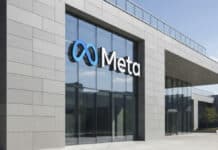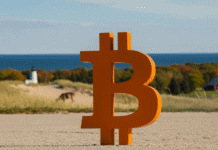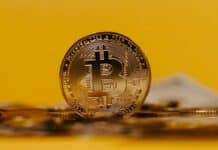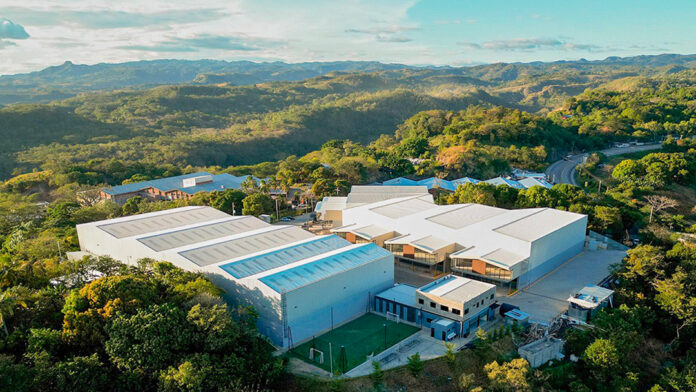
Burgo de Osma inaugurated the first industrial warehouse complex financed through tokenization in El Salvador, a mechanism supported by the country's Digital Assets Law.
Recently, Salvadoran construction company Burgo de Osma inaugurated CODOBOSA, a complex of 10 industrial warehouses in the municipality of Zaragoza, La Libertad, El Salvador.
This project, valued at $21 million dollars, stands out for being The first in the country partially financed through tokenization under the Digital Assets Law in force since 2023The work includes tecnología blockchain to manage its debt and attract international investors, a model that could redefine the Central American real estate market.
BUY BITCOINTokenization, a process that allows real-world assets to be converted into digital tokens registered on a blockchain, has been key to the construction of this warehouse complex. According to the company, the industrial complex in question represents a technological advancement and reflects a shift in the country's economic outlook, opening up new opportunities for investors and entrepreneurs.
Overall, the combination of blockchain technology and an innovative legal framework has laid the foundation for a more inclusive and transparent financial ecosystem in El Salvador.
CODOBOSA: Logistics innovation and tokenization in Zaragoza
CODOBOSA covers 15.044 m2 in the municipality of Zaragoza, designed for logistics and manufacturing companies. Its warehouses include automated curtains, capacity for five levels of racking, a medium-voltage electrical substation, and a wastewater treatment plant. Luis Rodríguez, CEO of the Council of Mayors of the Metropolitan Area of San Salvador, assured through the social network X the design prioritizes “operational efficiency and environmental sustainability.”
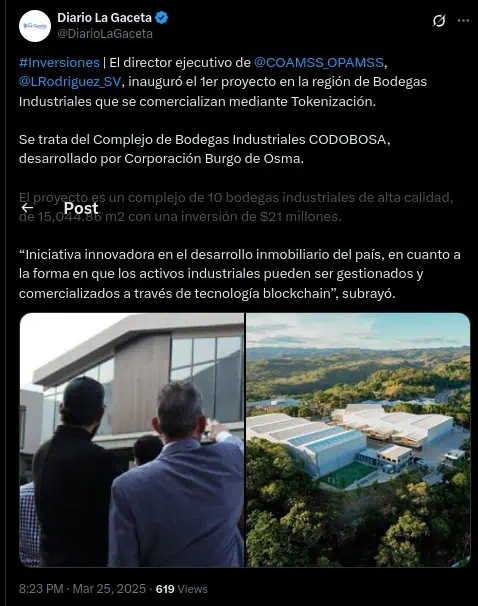
During the inauguration, the president of Burgo de Osma, Javier Aylagas, highlighted that tokenization “breaks paradigms” By allowing small and large investors to participate in real estate projects through fractional purchases. The model uses blockchain to record transactions, ensuring traceability and reducing financial intermediaries.
Although the specific platform was not revealed, Julio Valdés of MIO3 explained that a blockchain specialized in RWA assets was used.
LINK CARD AND EARNTokenization: The engine of El Salvador
CODOBOSA's tokenized financing operates under the Digital Asset Issuance Law, Reformed in October 2024 to strengthen investor protection. This mechanism divides the project's value into tokens, each backed by a portion of the debt, which can be purchased on regulated platforms. Unlike traditional methods, tokenization allows capital to be raised from anywhere in the world using cryptocurrencies or digital tokens.
To visualize the potential of this technological innovation, let us remember that in February of this year, the Interoceanic Consortium of Guatemala He launched COINGT, raising several million dollars to finance its cross-ocean logistics corridor. Similarly, the company e-Grains raised $100 million by tokenizing soybean crops. Other data revealed by the National Commission for Digital Assets (CNAD) indicates that $2024 billion in tokenized issuances were approved in 5.000, primarily to finance infrastructure and agricultural projects.

Basic Bitcoin Course
Basic levelStart from scratch in Bitcoin in a clear, easy, safe and quick way. This course is specially designed for beginners practically know nothing about Bitcoin.
CODOBOSA, a comprehensive and sustainable project
The CODOBOSA industrial complex is more than just a collection of industrial buildings; it's a comprehensive project designed to offer a wide range of services and benefits. Its construction represents a technological breakthrough with a huge impact on the Salvadoran economy and society.
BUY BITCOINOverall, the arrival of this project has generated direct and indirect jobs, boosting the local economy and attracting foreign investment, while strengthening El Salvador's image as an innovative and attractive country for business.
Investing in cryptoassets is not fully regulated, may not be suitable for retail investors due to high volatility and there is a risk of losing all invested amounts.
